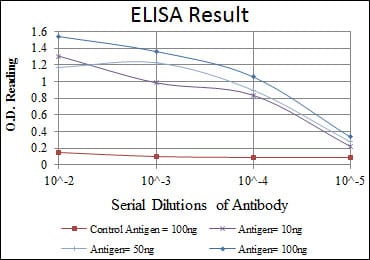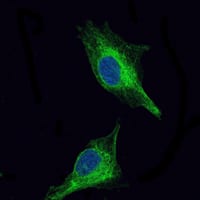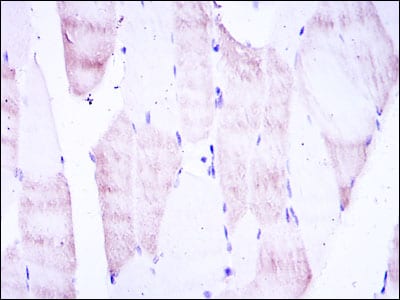


| WB | 咨询技术 | Human,Mouse,Rat |
| IF | 咨询技术 | Human,Mouse,Rat |
| IHC | 1/200 - 1/1000 | Human,Mouse,Rat |
| ICC | 1/200 - 1/1000 | Human,Mouse,Rat |
| FCM | 咨询技术 | Human,Mouse,Rat |
| Elisa | 1/10000 | Human,Mouse,Rat |
| Aliases | BHLHB1; OLIGO2; RACK17; PRKCBP2; bHLHe19; OLIG2 |
| Entrez GeneID | 10215 |
| clone | 1G11 |
| WB Predicted band size | 32kDa |
| Host/Isotype | Mouse IgG1 |
| Antibody Type | Primary antibody |
| Storage | Store at 4°C short term. Aliquot and store at -20°C long term. Avoid freeze/thaw cycles. |
| Species Reactivity | Human |
| Immunogen | Purified recombinant fragment of human OLIG2 expressed in E. Coli. |
| Formulation | Purified antibody in PBS with 0.05% sodium azide. |
+ +
以下是关于OLIG2抗体的3篇参考文献的简要信息:
1. **文献名称**:*"Olig2 transcription factor in the developing and injured forebrain: cell lineage and gliogenesis"*
**作者**:Takebayashi H, et al.
**摘要**:研究通过OLIG2抗体的免疫组化分析,揭示了Olig2在中枢神经系统发育中的关键作用,尤其是在少突胶质细胞谱系分化及损伤后神经干细胞中的动态表达模式。
2. **文献名称**:*"Olig2 regulates neural stem cell fate in gliomagenesis"*
**作者**:Ligon KL, et al.
**摘要**:利用OLIG2抗体在胶质瘤组织中的染色,发现Olig2高表达与肿瘤干细胞自我更新相关,提示其可作为恶性胶质瘤预后和治疗靶点的潜在标志物。
3. **文献名称**:*"A standardized immunohistochemical approach for the characterization of human oligodendrocytes in brain tumors"*
**作者**:Mehta S, et al.
**摘要**:提出基于OLIG2抗体的标准化免疫组化流程,用于区分胶质瘤中的少突胶质细胞来源肿瘤细胞,并验证其与IDH突变状态的相关性,强调其在病理诊断中的实用性。
(注:以上文献信息为示例性概括,实际引用请核对原文准确性。)
OLIG2 (Oligodendrocyte Transcription Factor 2) is a basic helix-loop-helix (bHLH) transcription factor critical in the development of the central nervous system (CNS). It plays a pivotal role in specifying oligodendrocyte progenitor cells (OPCs) and motor neurons during embryogenesis. In adults, OLIG2 remains active in maintaining OPC populations and promoting oligodendrocyte differentiation, essential for myelination. Dysregulation of OLIG2 is implicated in neurological disorders, including gliomas, where its overexpression is a hallmark of oligodendrogliomas and other gliomas with oligodendroglial features.
OLIG2 antibodies are widely used in research and diagnostics to identify oligodendroglial lineage cells in CNS tissues. These antibodies help distinguish oligodendrogliomas from astrocytomas in neuropathology, as OLIG2 expression is typically retained in the former but reduced in the latter. Commercially available OLIG2 antibodies (e.g., monoclonal clones like 211F1.1) target specific epitopes, enabling reliable detection via immunohistochemistry (IHC) or immunofluorescence (IF). However, staining interpretation requires caution, as OLIG2 may also label reactive glia or neuronal subtypes in certain contexts.
Recent studies explore OLIG2's role in tumorigenesis, particularly its interaction with IDH mutations, and its potential as a therapeutic target. Its antibody-based detection remains a cornerstone in neuro-oncology and developmental biology research.
×